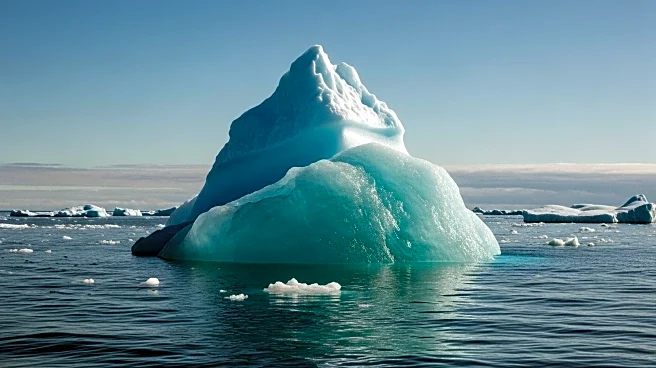What's Happening?
A study conducted by researchers at UC Riverside indicates that the current global warming trend could potentially lead to a future ice age. The research builds on existing models of rock weathering and ocean carbon cycles, suggesting that Earth's climate system might overshoot its regulatory mechanisms, resulting in significant cooling. Historically, Earth's climate has alternated between periods of extreme warmth and glacial epochs, driven by the planet's carbon balance. This balance is maintained through geological processes like rock weathering, where rainwater interacts with silicate-rich rocks, absorbing carbon dioxide and eventually sequestering it in the ocean. The study highlights the role of oceans in amplifying cooling, as warming leads to increased nutrient flow into oceans, promoting plankton growth that absorbs carbon. However, as oceans warm and lose oxygen, this process can malfunction, leading to a feedback loop that accelerates cooling.
Why It's Important?
The findings of this study are significant as they challenge the current understanding of Earth's climate regulation and highlight the potential for dramatic climate shifts. The research underscores the importance of understanding feedback loops in climate systems, as these can lead to unpredictable outcomes. The study suggests that while natural processes have historically stabilized Earth's climate, the accelerated pace of human-induced warming may disrupt these mechanisms. This has implications for climate policy and the urgency of addressing current warming trends. The potential for a future ice age, although distant, emphasizes the need for immediate action to mitigate ongoing climate change and its impacts on global ecosystems and human societies.
What's Next?
The study calls for a focus on limiting current warming trends to prevent potential catastrophic climate shifts. Researchers emphasize the need for refined climate models that integrate both natural processes and human-driven changes to better predict future climate scenarios. The findings suggest that while Earth may eventually cool due to natural cycles, the timeline for such changes is uncertain, and the immediate priority should be managing current warming. This research could influence future climate policies and strategies aimed at reducing greenhouse gas emissions and enhancing carbon sequestration efforts.
Beyond the Headlines
The study highlights the complexity and unpredictability of Earth's climate system, emphasizing the need for a deeper understanding of feedback loops and their role in climate regulation. It raises ethical considerations about the responsibility of current generations to address climate change and its potential long-term impacts. The research also points to the importance of interdisciplinary approaches in climate science, combining geological, oceanographic, and atmospheric studies to develop comprehensive climate models.











